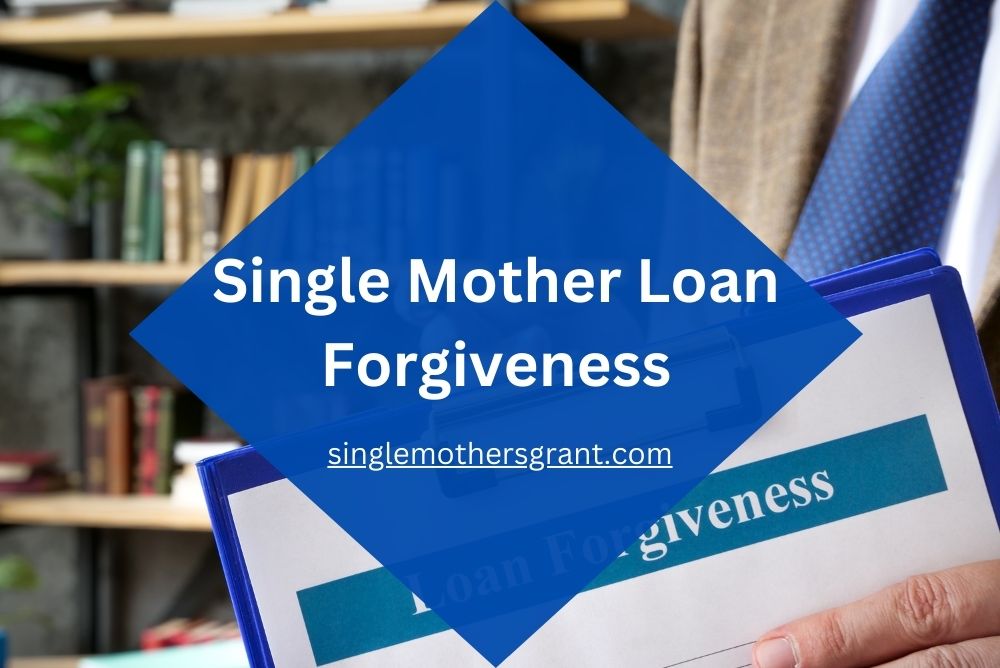Managing student loan debt as a single mother can be overwhelming. Fortunately, single-mother loan forgiveness programs are designed to help ease this burden. In this guide, we’ll explore how these programs work, including eligibility criteria and benefits. We’ll also provide resources and tools to assist single mothers seeking loan forgiveness, such as government agencies, non-profit organizations, and financial advisors.
Landscape of Single Mother Loan Forgiveness
In the realm of single-mother loan forgiveness, a dynamic discourse is unfolding. Advocates stress the importance of tailored relief programs, recognizing the distinct challenges faced by single mothers in managing family responsibilities and financial obligations.

Proposals for dedicated initiatives at various levels of government abound, seeking to provide targeted support. However, discussions are ongoing, with critics emphasizing the need for a comprehensive approach to student loan reform that considers the broader financial landscape for all borrowers.
The evolving landscape reflects a quest for equitable solutions that address the unique circumstances of single mothers while maintaining fairness across the board.
Identifying Qualifying Single Mother Loans
Before delving into the world of loan forgiveness, it’s essential to identify which loans may be eligible for forgiveness. Generally, federal student loans are the primary focus of forgiveness programs. These may include:
1. Direct Subsidized Loans: These loans are based on financial need and have favorable terms, making them a common choice for students.
2. Direct Unsubsidized Loans: These loans are available to eligible undergraduate, graduate, and professional students. They do not require a demonstration of financial need.
3. Federal Perkins Loans: These low-interest loans are awarded to students with exceptional financial need.
4. Direct Consolidation Loans: These loans allow you to combine multiple federal student loans into one, potentially simplifying the repayment process.
Eligibility requirements for loan forgiveness programs can vary, but some common criteria include:
1. Income-Based Repayment: Some programs require that you participate in income-driven repayment plans, where your monthly payments are based on your income and family size.
2. Public Service: Certain forgiveness programs, such as Public Service Loan Forgiveness (PSLF), may require you to work in a qualifying public service job for a specified period.
3. Loan Repayment Period: Most forgiveness programs require you to make a certain number of on-time payments over a specified period before forgiveness is granted.
Dispelling Myths And Misconceptions
Loan forgiveness programs can be shrouded in myths and misconceptions. It’s important to separate fact from fiction:
1. Myth: Loan forgiveness is automatic. In reality, you must actively apply for and meet the requirements of forgiveness programs.
2. Myth: All loans are eligible. While federal loans are often eligible, private loans are typically not eligible for forgiveness.
3. Myth: Loan forgiveness erases all debt. Depending on the program, forgiveness may cover a portion of your outstanding balance.
Unveiling the Benefits of Single Mother Loan Forgiveness
Enhanced Financial Security and Stability
One of the most significant benefits of loan forgiveness for single mothers is enhanced financial security and stability. By reducing or eliminating student loan debt, you can allocate more of your income towards essential expenses like housing, childcare, and groceries.

This financial relief can be a game-changer for single mothers striving to provide a stable and nurturing environment for their families.
Empowering Single Mothers and Their Families
Loan forgiveness programs empower single mothers by giving them the opportunity to pursue higher education and career advancement without the fear of overwhelming debt. This empowerment extends beyond the individual and positively impacts the entire family. Children raised by mothers with improved financial stability often have better access to educational and extracurricular opportunities.
Additional Articles: Obamas Loan Program And Its Long-Term Impact
Contributing to a Stronger Economy
By alleviating the financial burden of student loan debt for single mothers, loan forgiveness programs contribute to a stronger economy. When single mothers can invest in education, secure better-paying jobs, and participate in the workforce more effectively, it bolsters economic growth at both the individual and national levels. A more financially stable and productive workforce benefits everyone.
Resources and Tools For Single Mothers Seeking Loan Forgiveness
Entering the intricate realm of loan forgiveness presents a complex landscape, especially for single mothers who must navigate the intersection of financial challenges and familial responsibilities.

However, amidst this complexity, there exists a range of resources and tools designed to provide crucial assistance to single mothers embarking on this journey.
These resources aim to demystify the intricacies of loan forgiveness, offering guidance on eligibility criteria, application processes, and the array of available programs.
Whether through online platforms, counseling services, or community support networks, these resources empower single mothers with the knowledge and tools they need to make informed decisions about their financial future.
By tapping into these valuable assets, single mothers can gain clarity, confidence, and a sense of control over the often-daunting landscape of loan forgiveness, facilitating a smoother path toward financial well-being.
Government Agencies and Programs
Federal Student Aid (FSA): The FSA website is a valuable resource for information on federal student loans, repayment options, and forgiveness programs.
Public Service Loan Forgiveness (PSLF): PSLF is a program specifically designed for those working in public service jobs, and the U.S. Department of Education offers guidance on its requirements.
Income-Driven Repayment Plans: The Department of Education provides information on income-driven repayment plans like Income-Based Repayment (IBR) and Pay As You Earn (PAYE).
Related Content: Student Loans for Single Moms: Back to School
Non-Profit Organizations and Support Groups
American Association of University Women (AAUW): AAUW offers scholarships and resources to help women, including single mothers, navigate the educational journey.
Local Community Organizations: Many local non-profit organizations offer financial counseling and assistance with navigating loan forgiveness programs.
Single Parent Support Groups: Joining local or online single-parent support groups can connect you with others who have experience with loan forgiveness and can offer valuable insights and advice.
Financial Advisors and Legal Counsel
Certified Financial Planners (CFPs): Financial advisors can help you create a plan for managing student loan debt and achieving financial goals.
Legal Aid Services: If you encounter legal issues related to loans or debt, legal aid services can provide guidance and representation.
Student Loan Attorneys: These specialized attorneys can help you navigate complex student loan issues, including disputes and forgiveness applications.
Conclusion
Single-mother loan forgiveness programs provide essential support for managing education and family responsibilities. Understanding the eligibility, dispelling myths, and using available resources can help single mothers confidently achieve loan forgiveness. Remember, assistance is available from professionals and organizations, aiding in fulfilling your educational and financial goals for a brighter future for you and your family.
